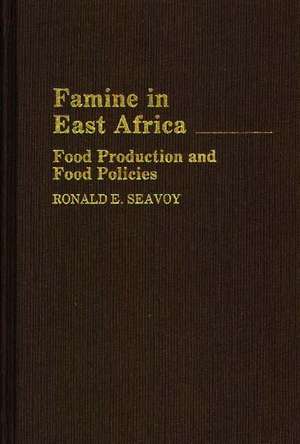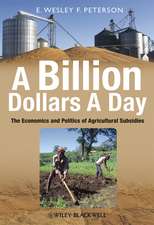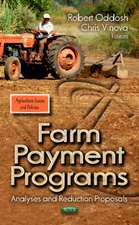Famine in East Africa: Food Production and Food Policies: Contributions in Afro-American & African Studies, cartea 0125
Autor Ronald E. Seavoyen Limba Engleză Hardback – 31 aug 1989
Efforts to commercialize agriculture in peasant societies through investments in technology and various pricing strategies have failed to create the food surpluses needed to forestall famine and support industrialization in East Africa. Seavoy explores this problem, basing his study on the case of Tanzania, a country that experiences recurrent peacetime famines associated with failures in subsistence agriculture. Providing an analysis of East African subsistence culture, he investigates the failures of national agricultural policies and defines strategies for inducing subsistence farmers to shift to commercial production.
Seavoy looks at various development initiatives involving technological inputs, political pressure, taxation, and land tenure provisions and their effects on the political economy of subsistence agriculture. He presents a detailed survey of subsistence culture, its agricultural and pastoral practices, and such variables as labor, topography, rainfall, and population density. The shaping of the East African political economy under colonial rule is discussed, together with the economic, social, and political legacy that has persisted to the present day. Seavoy examines Tanzanian agricultural policy, which has aimed at facilitating the transition to commercial agriculture. He finds that the country is a long way from achieving the assured food surpluses that would enable the nation to support an urban industrial workforce. Among the underlying causes he notes the continuing population explosion, the farmers' objections to commercialized agriculture, and deficiencies in the physical infrastructure, trained personnel, and political institutions. He argues that surpluses will not be created until political leaders use the power of national government to enforce the shift to commercial production. A noteworthy and original contribution to development literature, this work is relevant to studies in modern political economy, Third World development, agricultural economy, and related disciplines.
Din seria Contributions in Afro-American & African Studies
- 42%
 Preț: 414.89 lei
Preț: 414.89 lei - 38%
 Preț: 444.60 lei
Preț: 444.60 lei - 41%
 Preț: 363.18 lei
Preț: 363.18 lei - 51%
 Preț: 301.92 lei
Preț: 301.92 lei - 24%
 Preț: 463.05 lei
Preț: 463.05 lei - 28%
 Preț: 462.87 lei
Preț: 462.87 lei - 48%
 Preț: 418.59 lei
Preț: 418.59 lei - 14%
 Preț: 354.30 lei
Preț: 354.30 lei - 38%
 Preț: 344.90 lei
Preț: 344.90 lei - 42%
 Preț: 304.66 lei
Preț: 304.66 lei - 31%
 Preț: 284.53 lei
Preț: 284.53 lei - 38%
 Preț: 439.09 lei
Preț: 439.09 lei - 51%
 Preț: 253.32 lei
Preț: 253.32 lei - 52%
 Preț: 250.96 lei
Preț: 250.96 lei - 42%
 Preț: 414.97 lei
Preț: 414.97 lei - 47%
 Preț: 374.33 lei
Preț: 374.33 lei - 38%
 Preț: 444.08 lei
Preț: 444.08 lei - 38%
 Preț: 438.33 lei
Preț: 438.33 lei - 38%
 Preț: 434.61 lei
Preț: 434.61 lei - 52%
 Preț: 297.27 lei
Preț: 297.27 lei - 27%
 Preț: 441.56 lei
Preț: 441.56 lei - 24%
 Preț: 363.98 lei
Preț: 363.98 lei - 38%
 Preț: 344.22 lei
Preț: 344.22 lei - 50%
 Preț: 310.25 lei
Preț: 310.25 lei - 38%
 Preț: 344.05 lei
Preț: 344.05 lei - 34%
 Preț: 364.82 lei
Preț: 364.82 lei - 38%
 Preț: 438.41 lei
Preț: 438.41 lei - 35%
 Preț: 364.22 lei
Preț: 364.22 lei - 38%
 Preț: 500.60 lei
Preț: 500.60 lei - 18%
 Preț: 322.11 lei
Preț: 322.11 lei - 27%
 Preț: 439.51 lei
Preț: 439.51 lei - 38%
 Preț: 437.75 lei
Preț: 437.75 lei - 27%
 Preț: 465.50 lei
Preț: 465.50 lei - 24%
 Preț: 463.64 lei
Preț: 463.64 lei - 52%
 Preț: 251.53 lei
Preț: 251.53 lei - 15%
 Preț: 351.26 lei
Preț: 351.26 lei - 38%
 Preț: 344.38 lei
Preț: 344.38 lei - 27%
 Preț: 512.87 lei
Preț: 512.87 lei - 38%
 Preț: 344.63 lei
Preț: 344.63 lei - 38%
 Preț: 437.15 lei
Preț: 437.15 lei - 44%
 Preț: 167.96 lei
Preț: 167.96 lei - 28%
 Preț: 344.31 lei
Preț: 344.31 lei - 45%
 Preț: 328.88 lei
Preț: 328.88 lei - 51%
 Preț: 304.57 lei
Preț: 304.57 lei
Preț: 440.03 lei
Preț vechi: 709.03 lei
-38% Nou
84.23€ • 91.52$ • 70.80£
Carte tipărită la comandă
Livrare economică 21 aprilie-05 mai
Specificații
ISBN-10: 0313267553
Pagini: 289
Dimensiuni: 164 x 243 x 28 mm
Greutate: 0.64 kg
Ediția:New.
Editura: Greenwood Press
Seria Contributions in Afro-American & African Studies
Descriere
Seavoy looks at various development initiatives involving technological inputs, political pressure, taxation, and land tenure provisions and their effects on the political economy of subsistence agriculture. He presents a detailed survey of subsistence culture, its agricultural and pastoral practices, and such variables as labor, topography, rainfall, and population density. The shaping of the East African political economy under colonial rule is discussed, together with the economic, social, and political legacy that has persisted to the present day. Seavoy examines Tanzanian agricultural policy, which has aimed at facilitating the transition to commercial agriculture. He finds that the country is a long way from achieving the assured food surpluses that would enable the nation to support an urban industrial workforce. Among the underlying causes he notes the continuing population explosion, the farmers' objections to commercialized agriculture, and deficiencies in the physical infrastructure, trained personnel, and political institutions. He argues that surpluses will not be created until political leaders use the power of national government to enforce the shift to commercial production. A noteworthy and original contribution to development literature, this work is relevant to studies in modern political economy, Third World development, agricultural economy, and related disciplines.










